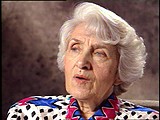<< Previous | Displaying results 351-400 of 571 for "" | Next >>
-
Irene Hizme and Rene Slotkin describe medical experiments
Oral HistoryIrene Hizme and Rene Slotkin, Jewish twins born in 1937 in Czechoslovakia, were deported with their mother to Theresienstadt, then Auschwitz. They describe the medical experiments to which they were subjected. Benno Müller-Hill, professor of genetics, University of Cologne, comments on Nazi medical experiments. Simon Rosenkier, a Polish Jew who was deported to Auschwitz-Birkenau, describes medical experiments at Auschwitz. [Photo credits: Getty Images, New York City; Yad Vashem, Jerusalem;…
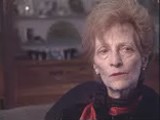
-
Paul Eggert, Helga Gross, and Dorothea Buck describe forced sterilization
Oral HistoryPaul Eggert was categorized as "feeble-minded." At age 11, he was institutionalized and sterilized without his knowledge. Helga Gross attended a school for the deaf in Hamburg, Germany. She was sterilized in 1939, aged 16. At age 19, Dorothea Buck was diagnosed as schizophrenic and sterilized without her knowledge. [Photo credits: Getty Images, New York City; Yad Vashem, Jerusalem; Max-Planck-Institut für Psychiatrie (Deutsche Forschungsanstalt für Psychiatrie), Historisches Archiv, Bildersammlung GDA,…
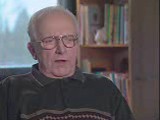
-
Benno Müller-Hill discusses genetics and eugenics
Oral HistoryBenno Müller-Hill, professor of Genetics, University of Cologne, and author of Murderous Science, discusses genetics and eugenics. [Photo credits: Getty Images, New York City; Yad Vashem, Jerusalem; Max-Planck-Institut für Psychiatrie (Deutsche Forschungsanstalt für Psychiatrie), Historisches Archiv, Bildersammlung GDA, Munich; Bundesarchiv Koblenz, Germany; Dokumentationsarchiv des österreichischen Widerstandes, Vienna; Kriemhild Synder: Die Landesheilanstalt Uchtspringe und ihre Verstrickung in…
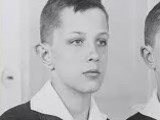
-
John Dolibois describes attitude of captured Nazi leaders
Oral HistoryJohn Dolibois immigrated to the United States in 1931 at the age of 13. After graduating from college, Dolibois joined the 16th Armored Division of the US Army. Due to his German language skills, he became involved in military intelligence. He returned to Europe in this capacity toward the end of World War II. Dolibois interrogated German prisoners of war, including leading Nazis, in preparation for the postwar trials of war criminals. He was later appointed US ambassador to Luxembourg, his birthplace.
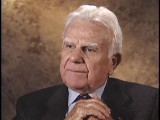
-
John Dolibois describes interrogating captured Nazi officials
Oral HistoryJohn Dolibois immigrated to the United States in 1931 at the age of 13. After graduating from college, Dolibois joined the 16th Armored Division of the US Army. Due to his German language skills, he became involved in military intelligence. He returned to Europe in this capacity toward the end of World War II. Dolibois interrogated German prisoners of war, including leading Nazis, in preparation for the postwar trials of war criminals. He was later appointed US ambassador to Luxembourg, his birthplace.
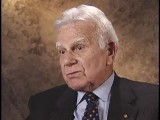
-
Edward Adler recalls forced labor and conditions in the Sachsenhausen camp
Oral HistorySeveral of the IMT defendants were charged with exploiting concentration camp inmates for forced labor under harsh conditions, like those described here by Holocaust survivor Edward Adler. Edward was born to a Jewish family in Hamburg. In 1935, the Nuremberg Laws prohibited marriage or sexual relations between German non-Jews and Jews. Edward was then in his mid-twenties. Edward was arrested for dating a non-Jewish woman. Classified as a habitual offender, he was later deported to the Sachsenhausen…
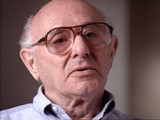
-
Belle Mayer Zeck reflects upon the sentences given to leaders of the economy
Oral HistoryBelle Mayer trained as a lawyer and worked for the General Counsel of the US Treasury, Foreign Funds Control Bureau. This bureau worked to enforce the Trading With the Enemy Act passed by Congress. In this capacity, Mayer became familiar with the German I. G. Farben chemical company, a large conglomerate that used slave labor during World War II. In 1945, Mayer was sent as a Department of Treasury representative to the postwar London Conference. She was present as representatives from the Allied nations…
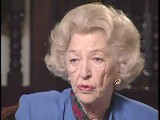
-
Belle Mayer Zeck describes difficult working conditions during the Nuremberg trials
Oral HistoryBelle Mayer trained as a lawyer and worked for the General Counsel of the US Treasury, Foreign Funds Control Bureau. This bureau worked to enforce the Trading With the Enemy Act passed by Congress. In this capacity, Mayer became familiar with the German I. G. Farben chemical company, a large conglomerate that used forced labor during World War II. In 1945, Mayer was sent as a Department of Treasury representative to the postwar London Conference. She was present as representatives from the Allied nations…
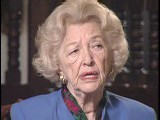
-
Belle Mayer Zeck describes working conditions and staffing at Nuremberg during the postwar trials
Oral HistoryBelle Mayer trained as a lawyer and worked for the General Counsel of the US Treasury, Foreign Funds Control Bureau. This bureau worked to enforce the Trading With the Enemy Act passed by Congress. In this capacity, Mayer became familiar with the German I. G. Farben chemical company, a large conglomerate that used slave labor during World War II. In 1945, Mayer was sent as a Department of Treasury representative to the postwar London Conference. She was present as representatives from the Allied nations…
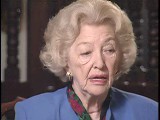
-
Belle Mayer Zeck describes the impact of the Nuremberg trials on her
Oral HistoryBelle Mayer trained as a lawyer and worked for the General Counsel of the US Treasury, Foreign Funds Control Bureau. This bureau worked to enforce the Trading With the Enemy Act passed by Congress. In this capacity, Mayer became familiar with the German I. G. Farben chemical company, a large conglomerate that used slave labor during World War II. In 1945, Mayer was sent as a Department of Treasury representative to the postwar London Conference. She was present as representatives from the Allied nations…
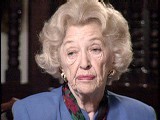
-
Belle Mayer Zeck describes the emotional toll of the Nuremberg trials
Oral HistoryBelle Mayer trained as a lawyer and worked for the General Counsel of the US Treasury, Foreign Funds Control Bureau. This bureau worked to enforce the Trading With the Enemy Act passed by Congress. In this capacity, Mayer became familiar with the German I. G. Farben chemical company, a large conglomerate that used forced labor during World War II. In 1945, Mayer was sent as a Department of Treasury representative to the postwar London Conference. She was present as representatives from the Allied nations…
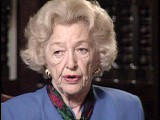
-
Drexel Sprecher describes German documentation that could be used as evidence
Oral HistoryDrexel Sprecher was educated at the University of Wisconsin, the London School of Economics, and at the Harvard School of Law before receiving a position at the US Government's Labor Board in 1938. He enlisted in the American military after the United States declared war on Germany, and was posted to London. After the war, Sprecher served as a prosecutor of Nazi war criminals at the Nuremberg trials.
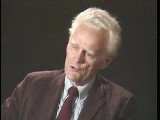
-
Drexel Sprecher describes a witness at the Nuremberg trials
Oral HistoryDrexel Sprecher was educated at the University of Wisconsin, the London School of Economics, and at the Harvard School of Law before receiving a position at the US Government's Labor Board in 1938. He enlisted in the American military after the United States declared war on Germany, and was posted to London. After the war, Sprecher served as a prosecutor of Nazi war criminals at the Nuremberg trials.
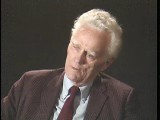
-
William (Bill) Zeck describes war crimes trial prosecution staff
Oral HistoryBefore joining the US Army, Zeck—a lawyer—worked for the Board of Economic Warfare. In 1946, he was hired to work on preparations for the Nuremberg trials. In his search for documents pertaining to the I. G. Farben company's involvement in the war, Zeck also met attorney Belle Mayer, his future wife. Both Zeck and Mayer were involved in preparing the indictment in the I. G. Farben trial held at Nuremberg.
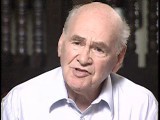
-
William (Bill) Zeck describes translation and witnesses during war crimes trials
Oral HistoryBefore joining the US Army, Zeck—a lawyer—worked for the Board of Economic Warfare. In 1946, he was hired to work on preparations for the Nuremberg trials. In his search for documents pertaining to the I. G. Farben company's involvement in the war, Zeck also met attorney Belle Mayer, his future wife. Both Zeck and Mayer were involved in preparing the indictment in the I. G. Farben trial held at Nuremberg.
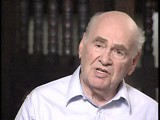
-
Belle Mayer Zeck describes the size and influence of IG Farben
Oral HistoryBelle Mayer trained as a lawyer and worked for the General Counsel of the US Treasury, Foreign Funds Control Bureau. This bureau worked to enforce the Trading With the Enemy Act passed by Congress. In this capacity, Mayer became familiar with the German I. G. Farben chemical company, a large conglomerate that used slave labor during World War II. In 1945, Mayer was sent as a Department of Treasury representative to the postwar London Conference. She was present as representatives from the Allied nations…
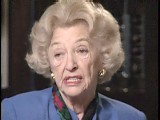
-
Belle Mayer Zeck describes research about IG Farben for the postwar trial
Oral HistoryBelle Mayer trained as a lawyer and worked for the General Counsel of the US Treasury, Foreign Funds Control Bureau. This bureau worked to enforce the Trading With the Enemy Act passed by Congress. In this capacity, Mayer became familiar with the German I. G. Farben chemical company, a large conglomerate that used slave labor during World War II. In 1945, Mayer was sent as a Department of Treasury representative to the postwar London Conference. She was present as representatives from the Allied nations…
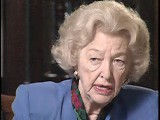
-
William (Bill) Zeck describes acquiring evidence for war crimes trials
Oral HistoryBefore joining the US Army, Zeck—a lawyer—worked for the Board of Economic Warfare. In 1946, he was hired to work on preparations for the Nuremberg trials. In his search for documents pertaining to the I. G. Farben company's involvement in the war, Zeck also met attorney Belle Mayer, his future wife. Both Zeck and Mayer were involved in preparing the indictment in the I. G. Farben trial held at Nuremberg.
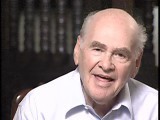
-
Moses Zupnik describes facilities for the Mir Yeshiva in Shanghai
Oral HistoryMoses was 16 years old when the Nazis came to power in January 1933. He attended the Mir Yeshiva, a Jewish religious school based in Mir, Poland. German forces invaded Poland in September 1939. The Soviet Union occupied eastern Poland less than three weeks later. Mir was in Soviet-occupied Poland. Moses and the entire Mir Yeshiva moved to Vilna, Lithuania, so they could continue their studies without Soviet interference. When the Soviet Union occupied Lithuania in 1940, leaders of the yeshiva decided they…
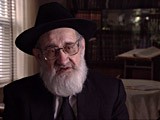
-
Drexel Sprecher describes reconstruction of buildings in Nuremberg
Oral HistoryDrexel Sprecher was educated at the University of Wisconsin, the London School of Economics, and at the Harvard School of Law before receiving a position at the US Government's Labor Board in 1938. He enlisted in the American military after the United States declared war on Germany, and was posted to London. After the war, Sprecher served as a prosecutor of Nazi war criminals at the Nuremberg trials.
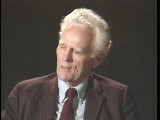
-
Drexel Sprecher describes reconstruction of the courtroom in Nuremberg
Oral HistoryDrexel Sprecher was educated at the University of Wisconsin, the London School of Economics, and at the Harvard School of Law before receiving a position at the US Government's Labor Board in 1938. He enlisted in the American military after the United States declared war on Germany, and was posted to London. After the war, Sprecher served as a prosecutor of Nazi war criminals at the Nuremberg trials.
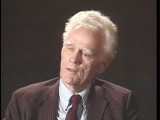
-
Drexel Sprecher describes layout of the courtroom at Nuremberg
Oral HistoryDrexel Sprecher was educated at the University of Wisconsin, the London School of Economics, and at the Harvard School of Law before receiving a position at the US Government's Labor Board in 1938. He enlisted in the American military after the United States declared war on Germany, and was posted to London. After the war, Sprecher served as a prosecutor of Nazi war criminals at the Nuremberg trials.
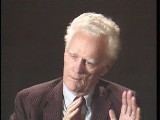
-
Drexel Sprecher describes war-damaged Nuremberg
Oral HistoryDrexel Sprecher was educated at the University of Wisconsin, the London School of Economics, and at the Harvard School of Law before receiving a position at the US Government's Labor Board in 1938. He enlisted in the American military after the United States declared war on Germany, and was posted to London. After the war, Sprecher served as a prosecutor of Nazi war criminals at the Nuremberg trials.
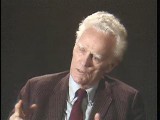
-
John Dolibois describes Justice Jackson's explanation of the purpose of the International Military Tribunal at Nuremberg
Oral HistoryJohn Dolibois immigrated to the United States in 1931 at the age of 13. After graduating from college, Dolibois joined the 16th Armored Division of the US Army. Due to his German language skills, he became involved in military intelligence. He returned to Europe in this capacity toward the end of World War II. Dolibois interrogated German prisoners of war, including leading Nazis, in preparation for the postwar trials of war criminals. He was later appointed US ambassador to Luxembourg, his birthplace.
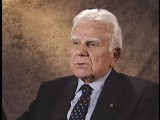
-
Ruth Webber describes the bitterness that she felt after the end of the war when she was in an orphanage in Krakow
Oral HistoryRuth was four years old when the Germans invaded Poland and occupied Ostrowiec. Her family was forced into a ghetto. Germans took over her father's photography business, although he was allowed to continue working outside the ghetto. Before the ghetto was liquidated, Ruth's parents sent her sister into hiding, and managed to get work at a labor camp outside the ghetto. Ruth also went into hiding, either in nearby woods or within the camp itself. When the camp was liquidated, Ruth's parents were split up.…
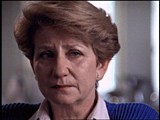
-
William (Bill) Zeck describes the "superior orders" defense
Oral HistoryBefore joining the US Army, Zeck—a lawyer—worked for the Board of Economic Warfare. In 1946, he was hired to work on preparations for the Nuremberg trials. In his search for documents pertaining to the I. G. Farben company's involvement in the war, Zeck also met attorney Belle Mayer, his future wife. Both Zeck and Mayer were involved in preparing the indictment in the I. G. Farben trial held at Nuremberg.
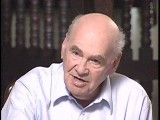
-
William (Bill) Zeck describes the role of the Nuremberg trials in establishing a historical record
Oral HistoryBefore joining the US Army, Zeck—a lawyer—worked for the Board of Economic Warfare. In 1946, he was hired to work on preparations for the Nuremberg trials. In his search for documents pertaining to the I. G. Farben company's involvement in the war, Zeck also met attorney Belle Mayer, his future wife. Both Zeck and Mayer were involved in preparing the indictment in the I. G. Farben trial held at Nuremberg.
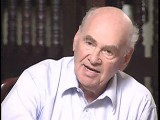
-
Historian Peter Black describes researching evidence for an OSI case
Oral HistoryIn the 1980s and 1990s, historian Peter Black worked for the US Department of Justice Office of Special Investigations, as part of a team tracking and prosecuting suspected war criminals. Black later served as the Senior Historian at the United States Holocaust Memorial Museum.
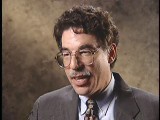
-
Peter Black describes the role of historians in researching war crimes cases for OSI
Oral HistoryIn the 1980s and 1990s, historian Peter Black worked for the US Department of Justice Office of Special Investigations, as part of a team tracking and prosecuting suspected war criminals. Black later served as the Senior Historian at the United States Holocaust Memorial Museum.
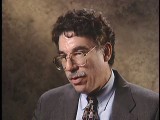
-
Historian Peter Black describes the legislation used to deal with Nazi offenders living in the United States
Oral HistoryIn the 1980s and 1990s, historian Peter Black worked for the US Department of Justice Office of Special Investigations, as part of a team tracking and prosecuting suspected war criminals. Black later served as the Senior Historian at the United States Holocaust Memorial Museum.
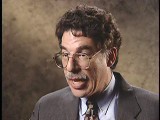
-
Historian Peter Black describes impact of the Braunsteiner Ryan case
Oral HistoryIn the 1980s and 1990s, historian Peter Black worked for the US Department of Justice Office of Special Investigations, as part of a team tracking and prosecuting suspected war criminals. Black later served as the Senior Historian at the United States Holocaust Memorial Museum.
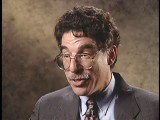
-
Historian Peter Black describes the process of documentation while investigating cases
Oral HistoryIn the 1980s and 1990s, historian Peter Black worked for the US Department of Justice Office of Special Investigations, as part of a team tracking and prosecuting suspected war criminals. Black later served as the Senior Historian at the United States Holocaust Memorial Museum.
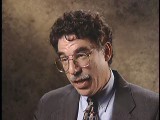
-
Historian Peter Black describes the value of eyewitness testimony
Oral HistoryIn the 1980s and 1990s, historian Peter Black worked for the US Department of Justice Office of Special Investigations, as part of a team tracking and prosecuting suspected war criminals. Black later served as the Senior Historian at the United States Holocaust Memorial Museum
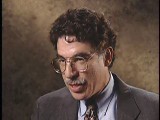
-
William Denson describes postwar trials of concentration camp personnel
Oral HistoryWilliam Denson graduated from the US Military Academy at West Point in 1934 and attended Harvard Law School. He returned to West Point to teach law from 1942 until 1945. In January 1945, Denson accepted the position of Judge Advocate General (JAG) in Europe and was assigned to US Third Army headquarters in Germany. He took part in more than 90 trials against Germans who had committed atrocities against downed American pilots. In August 1945, Denson became chief prosecutor for the US government at the…
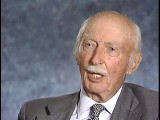
-
Robert Mills Donihi describes defendants at the postwar US trials in Germany
Oral HistoryIn 1945, Robert Mills Donihi was practicing law in Nashville, Tennessee. He accepted a government assignment to Tokyo where he worked on the trial of 28 high-ranking Japanese officers. After a year, he left for Germany, and arrived in Nuremberg in January 1947. Donihi was a member of the legal team at the postwar US trials in Germany, serving as both an interrogator and a prosecutor.
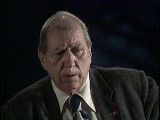
-
William Denson describes the nature of the evidence uncovered for postwar trials of concentration camp personnel
Oral HistoryWilliam Denson graduated from the US Military Academy at West Point in 1934 and attended Harvard Law School. He returned to West Point to teach law from 1942 until 1945. In January 1945, Denson accepted the position of Judge Advocate General (JAG) in Europe and was assigned to US Third Army headquarters in Germany. He took part in more than 90 trials against Germans who had committed atrocities against downed American pilots. In August 1945, Denson became chief prosecutor for the US government at the…
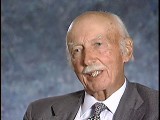
-
William Denson describes counsel provided to accused war criminals
Oral HistoryWilliam Denson graduated from the US Military Academy at West Point in 1934 and attended Harvard Law School. He returned to West Point to teach law from 1942 until 1945. In January 1945, Denson accepted the position of Judge Advocate General (JAG) in Europe and was assigned to US Third Army headquarters in Germany. He took part in more than 90 trials against Germans who had committed atrocities against downed American pilots. In August 1945, Denson became chief prosecutor for the US government at the…
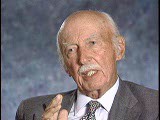
-
William Denson describes some of the emotional difficulties for witnesses in recalling their experiences
Oral HistoryWilliam Denson graduated from the US Military Academy at West Point in 1934 and attended Harvard Law School. He returned to West Point to teach law from 1942 until 1945. In January 1945, Denson accepted the position of Judge Advocate General (JAG) in Europe and was assigned to US Third Army headquarters in Germany. He took part in more than 90 trials against Germans who had committed atrocities against downed American pilots. In August 1945, Denson became chief prosecutor for the US government at the…
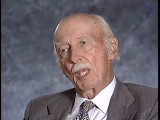
-
Robert Mills Donihi describes witnesses at the postwar US trials in Germany
Oral HistoryIn 1945, Robert Mills Donihi was practicing law in Nashville, Tennessee. He accepted a government assignment to Tokyo where he worked on the trial of 28 high-ranking Japanese officers. After a year, he left for Germany, and arrived in Nuremberg in January 1947. Donihi was a member of the legal team at the postwar US trials in Germany, serving as both an interrogator and a prosecutor.
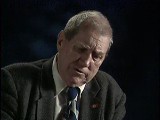
-
Robert Mills Donihi describes a Buchenwald survivor who became a witness at a postwar US trial in Germany
Oral HistoryIn 1945, Robert Mills Donihi was practicing law in Nashville, Tennessee. He accepted a government assignment to Tokyo where he worked on the trial of 28 high-ranking Japanese officers. After a year, he left for Germany, and arrived in Nuremberg in January 1947. Donihi was a member of the legal team at the postwar US trials in Germany, serving as both an interrogator and a prosecutor.
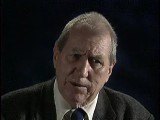
-
William Denson describes finding witnesses for the postwar trials of concentration camp personnel
Oral HistoryWilliam Denson graduated from the US Military Academy at West Point in 1934 and attended Harvard Law School. He returned to West Point to teach law from 1942 until 1945. In January 1945, Denson accepted the position of Judge Advocate General (JAG) in Europe and was assigned to US Third Army headquarters in Germany. He took part in more than 90 trials against Germans who had committed atrocities against downed American pilots. In August 1945, Denson became chief prosecutor for the US government at the…
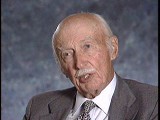
-
John Dolibois describes interrogating German prisoners in preparation for postwar trials
Oral HistoryJohn Dolibois immigrated to the United States in 1931 at the age of 13. After graduating from college, Dolibois joined the 16th Armored Division of the US Army. Due to his German language skills, he became involved in military intelligence. He returned to Europe in this capacity toward the end of World War II. Dolibois interrogated German prisoners of war, including leading Nazis, in preparation for the postwar trials of war criminals. He was later appointed US ambassador to Luxembourg, his birthplace.
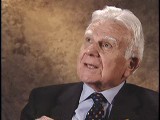
-
John Dolibois describes translating for a prison psychiatrist
Oral HistoryJohn Dolibois immigrated to the United States in 1931 at the age of 13. After graduating from college, Dolibois joined the 16th Armored Division of the US Army. Due to his German language skills, he became involved in military intelligence. He returned to Europe in this capacity toward the end of World War II. Dolibois interrogated German prisoners of war, including leading Nazis, in preparation for the postwar trials of war criminals. He was later appointed US ambassador to Luxembourg, his birthplace.

-
Historian Peter Black describes the potential of legal consequences
Oral HistoryIn the 1980s and 1990s, historian Peter Black worked for the US Department of Justice Office of Special Investigations, as part of a team tracking and prosecuting suspected war criminals. Black later served as the Senior Historian at the United States Holocaust Memorial Museum.
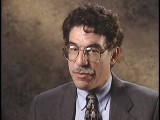
-
Esther Raab describes the arrival of transports in Sobibor
Oral HistoryEsther was born to a middle-class Jewish family in Chelm, Poland. In December 1942, she was deported from a work camp to the Sobibor killing center in occupied Poland. Upon arrival at Sobibor, Esther was selected to work in a sorting shed. She sorted clothing and the possessions of the people killed at the camp. During the summer and fall of 1943, Esther was among a group of prisoners in the Sobibor camp who planned an uprising and escape. Leon Feldhendler and Aleksandr (Sasha) Pechersky were the leaders…
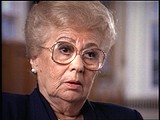
-
Historian Peter Black describes the importance of legal consequences
Oral HistoryIn the 1980s and 1990s, historian Peter Black worked for the US Department of Justice Office of Special Investigations, as part of a team tracking and prosecuting suspected war criminals. Black later served as the Senior Historian at the United States Holocaust Memorial Museum.
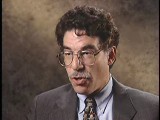
-
Peter Black describes why it is important to continue pursuing justice, even decades after the events
Oral HistoryIn the 1980s and 1990s, historian Peter Black worked for the US Department of Justice Office of Special Investigations, as part of a team tracking and prosecuting suspected war criminals. Black later served as the Senior Historian at the United States Holocaust Memorial Museum.
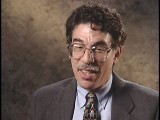
-
Emanuel Tanay describes the establishment of the Miechow ghetto
Oral HistoryEmanuel and his family lived in the small town of Miechow, north of Krakow. After Germany invaded Poland in September 1939, persecution of Jews increased. The Germans established a ghetto in Miechow. Emanuel was forced to live in the ghetto. Emanuel, his mother, and his sister escaped from the ghetto before it was destroyed in 1942. He stayed in a monastery, under an assumed identity, along with members of the Polish underground. Emanuel left the monastery after about a year when a teacher began to suspect…
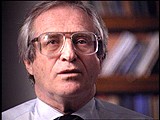
-
Leah Hammerstein Silverstein describes starvation in the Warsaw ghetto
Oral HistoryLeah grew up in Praga, a suburb of Warsaw, Poland. She was active in the Ha-Shomer ha-Tsa'ir Zionist youth movement. Germany invaded Poland in September 1939. Jews were forced to live in the Warsaw ghetto, which the Germans sealed off in November 1940. In the ghetto, Leah lived with a group of Ha-Shomer ha-Tsa'ir members. In September 1941, she and other members of the youth group escaped from the ghetto to a Ha-Shomer ha-Tsa'ir farm in Zarki, near Czestochowa, Poland. In May 1942, Leah became a courier…
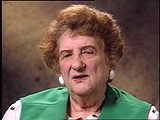
-
Blanka Rothschild describes the role of sharing and friendship in surviving the Lodz ghetto
Oral HistoryBlanka was an only child in a close-knit family in Lodz, Poland. Her father died in 1937. After the German invasion of Poland, Blanka and her mother remained in Lodz with Blanka's grandmother, who was unable to travel. Along with other relatives, they were forced into the Lodz ghetto in 1940. There, Blanka worked in a bakery. She and her mother later worked in a hospital in the Lodz ghetto, where they remained until late 1944 when they were deported to the Ravensbrueck camp in Germany. From Ravensbrueck,…
